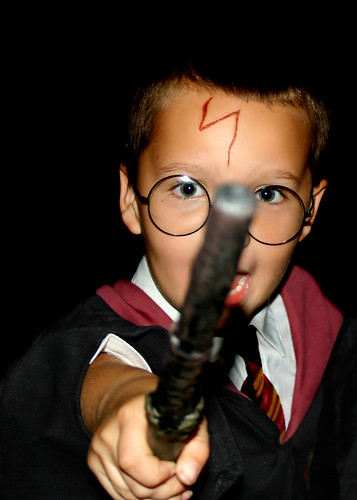 The world isn't divided into good people and Death Eaters. --Sirius Black to Harry Potter, Harry Potter and the Order of the Phoenix.
The world isn't divided into good people and Death Eaters. --Sirius Black to Harry Potter, Harry Potter and the Order of the Phoenix.Accio brain! --Ron Weasley to giant brain, Harry Potter and the Order of the Phoenix. Also what some folks evidently need to say, provided they ever find theirs again.
[Warning: This post isn't intended to be spoilery, and it segues (very lamely and very briefly) to what this blog is meant to cover, but I'm not trying not to be spoilery. If you haven't read/watched through HP No. 6, be ye warned.]
Recently I've been receiving (or re-receiving, in most cases) a small mountain of correspondence in the form of forwarded e-mails ("FW: Fwd: FW: RE: FW: Re: Ur DESTROYING ur CHILDREN") relating to Harry Potter. It coincides with the theatrical release of Harry Potter and the Half-Blood Prince. But really? I thought we were over this.
Even so, I'd be slightly sympathetic to (though not in agreement with) claims that the movie/book in this case
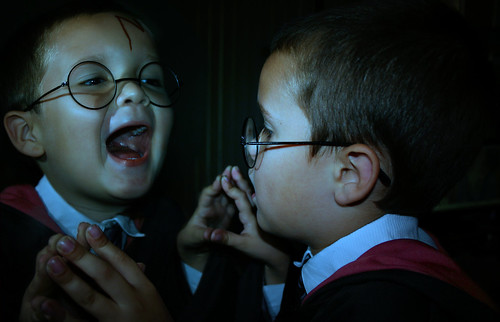 is too dark or morally ambiguous for children under, say, ten to handle. I'm sympathetic enough to these claims to clam up when says so in my presence, instead of pointing out that my seven-year-old son is currently part of the way through Half-Blood Prince, scary stuff, complexities and all. And I'd be in agreement with some claims against the movie, namely the baffling absence of two nearly made-for-the-screen scenes at the end of the book, severe abridgment of dialogue, the removal (again) of the Dursleys, heavy dilution of the titular aspect of the book/film, and other issues.
is too dark or morally ambiguous for children under, say, ten to handle. I'm sympathetic enough to these claims to clam up when says so in my presence, instead of pointing out that my seven-year-old son is currently part of the way through Half-Blood Prince, scary stuff, complexities and all. And I'd be in agreement with some claims against the movie, namely the baffling absence of two nearly made-for-the-screen scenes at the end of the book, severe abridgment of dialogue, the removal (again) of the Dursleys, heavy dilution of the titular aspect of the book/film, and other issues.That's not what these e-mails are about, of course. They're all the same. Though they all go into considerable pseudo-depth, decked out with numbers, bullet points, emoticons, and glittering smiling Jesuses; the upshot of every single one is: Witchraft = evil doings. Harry Potter teaches witchcraft. Kids learn witchcraft, turn evil. (Or, at least, the potential is there for them to learn to mutter incantations and sacrifice Fluffy at the next equinox. Or it might just desensitize them to occultism and they'll blithely hand over Fluffy. And really, who wants to take that chance?)
I take exception right away. Witchcraft isn't real, people. It isn't. It makes me want to restate it with all caps and periods after every word, it's so frustrating. Also, that's not what the Harry Potter series is about, any more than The Jungle Book is about the ability of animals to act in an anthropomorphic manner.
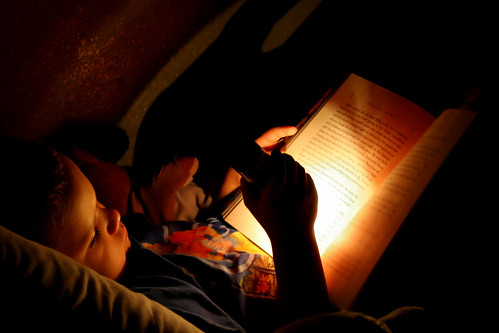
But what if kids don't realize that? What if they turn evil in some misguided quest to be like Harry?
But you know what; I say who cares, because the occult issue distracts from the bigger theme. What if kids don't know? Know what? The difference between real and fake? Between moral and immoral? Good and evil?
Kids are smarter and more nuanced than we acknowledge. If we've done a halfway decent job as parents, they can identify friendship and greed, right and wrong, Mom smiling indulgently and Mom looking like she wants to chuck me out the window of a moving car if I don't stop whining. In fact, if there's anything I really love about the Potter books lesson-wise, it's maintaining an understanding of these things in the face of ambiguity, flaws, and the startling realization that no one (not parents, not authority figures) is perfect. I think that's what makes people uncomfortable, even more than all that evil potion brewing. (For those who haven't read the books, the classes are used far more to show character interaction than magic. Potions, for example, resembles nothing so much as the dictatorship that was my seventh-grade Home Economics class.) It's easier to just tell our kids this is allowed; this is not. This is evil; this is good. Bad people
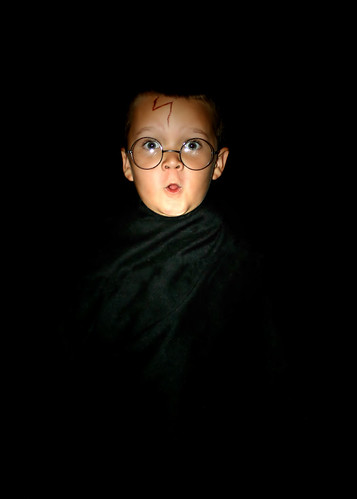 lack love; good parents never make mistakes; teachers and parents and cops never screw up.
lack love; good parents never make mistakes; teachers and parents and cops never screw up.It is easier, and I think it's necessary -- almost constantly when they're young, and to some extent throughout childhood. There is a threshold at which parents, teachers, and other authority figures have to have authority just because, a trust from kids that they do know what's best even when kids imagine adults to be far stupider than themselves. But what happens when the teacher is unable to protect you from bullies? What happens when you see Mom and Dad bellowing at each other, slamming doors unnecessarily? If your positive view of them hinged on their supposed perfection, and you've gotten old enough to realize adults are flawed, what then?
The characters in the Potter universe work through these realizations. It is our choices that define who we are, Dumbledore tells Harry. Love and protection and friendship and loyalty are hard won and diligently maintained. Almost all the parents love their children fiercely, even a bad-guy mom, and in all these people, love is to be admired. Bad guys turn out to be good. Good guys turn out to be bad, owing to poor choices. Look more closely, the whole series nearly shouts. Really get to know.
We've used the series to spark a number of conversations, and
 none of them about wand waving. We do miss people who are gone. Parents aren't perfect, but the good ones never stop trying to be. They'd do anything for their kids, they just don't always do the right things. However, they usually do, and you'd better listen to them if you ever want to receive another Bakugan toy. I think he respects me for being honest. I know it makes him more honest. And it makes him want know more about us. He's taken to keeping notes on us, and it has nothing to do with what we give him or what we won't let him do. He cares about us, as people and as parents.
none of them about wand waving. We do miss people who are gone. Parents aren't perfect, but the good ones never stop trying to be. They'd do anything for their kids, they just don't always do the right things. However, they usually do, and you'd better listen to them if you ever want to receive another Bakugan toy. I think he respects me for being honest. I know it makes him more honest. And it makes him want know more about us. He's taken to keeping notes on us, and it has nothing to do with what we give him or what we won't let him do. He cares about us, as people and as parents.I wish the e-mail forwarders would look more closely, or at least modify their write-it-off-automatically policy. It's like how David looks at the natural world. Did you know cockroaches spread disease rampantly? That daddy-longlegs have the most potent venom? David knows otherwise, because these things aren't true. I'll keep him away from actual bad influence, as well as disease and deadly venoms, but he has an overwhelming desire to see what's really up with just about everything. To branch out. To discover nuances, freak out about them, make the wrong assumptions, and come around to an understanding about life he didn't previously have. To challenge himself. To question. I'll never keep him from that.
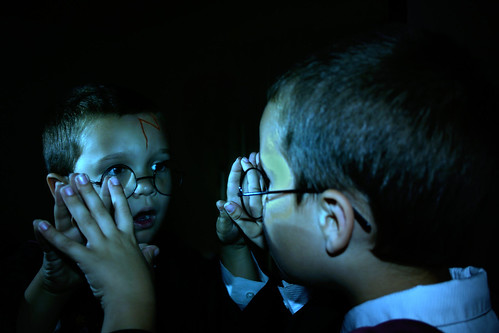
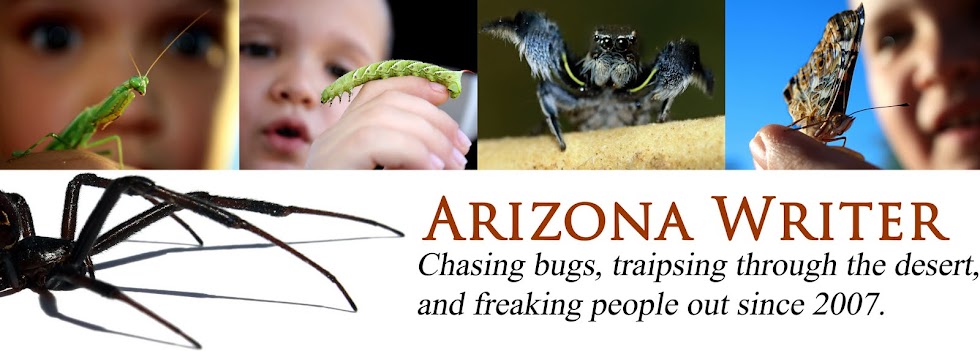
0 comments:
Post a Comment